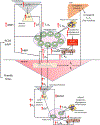Passing on PCOS: new insights into its epigenetic transmission
- PMID: 33657389
- PMCID: PMC9133658
- DOI: 10.1016/j.cmet.2021.02.008
Passing on PCOS: new insights into its epigenetic transmission
Abstract
Polycystic ovary syndrome (PCOS) is a prevalent reproductive-metabolic disorder with poorly understood etiology. Mimouni et al. (2021) demonstrate global genomic DNA hypomethylation in women with PCOS and their daughters, and in F3 generation PCOS-like mice, together with substantial normalization of PCOS-like mice by methyl donor dietary supplementation.
Copyright © 2021 Elsevier Inc. All rights reserved.
Conflict of interest statement
Declaration of Interests The authors declare no competing interests.
Figures

Comment on
-
Polycystic ovary syndrome is transmitted via a transgenerational epigenetic process.Cell Metab. 2021 Mar 2;33(3):513-530.e8. doi: 10.1016/j.cmet.2021.01.004. Epub 2021 Feb 3. Cell Metab. 2021. PMID: 33539777 Free PMC article.
References
-
- Asemi Z, Karamali M, Esmaillzadeh A. Metabolic response to folate supplementation in overweight women with polycystic ovary syndrome: a randomized double-blind placebo-controlled clinical trial. Mol Nutr Food Res. 2014. Jul;58(7):1465–73. - PubMed
-
- Bahmani F, Karamali M, Shakeri H, Asemi Z. The effects of folate supplementation on inflammatory factors and biomarkers of oxidative stress in overweight and obese women with polycystic ovary syndrome: a randomized, double-blind, placebo-controlled clinical trial. Clin Endocrinol (Oxf). 2014. Oct;81(4):582–7. - PubMed
Publication types
MeSH terms
Grants and funding
LinkOut - more resources
Full Text Sources
Other Literature Sources
Medical
Miscellaneous

